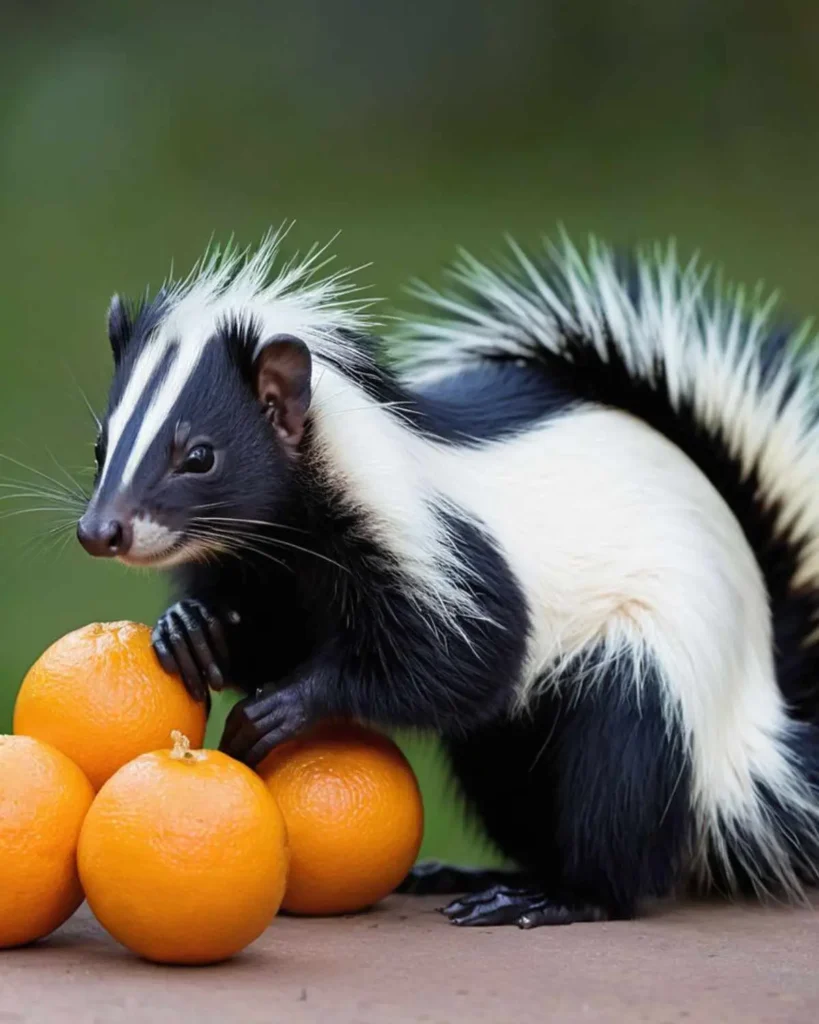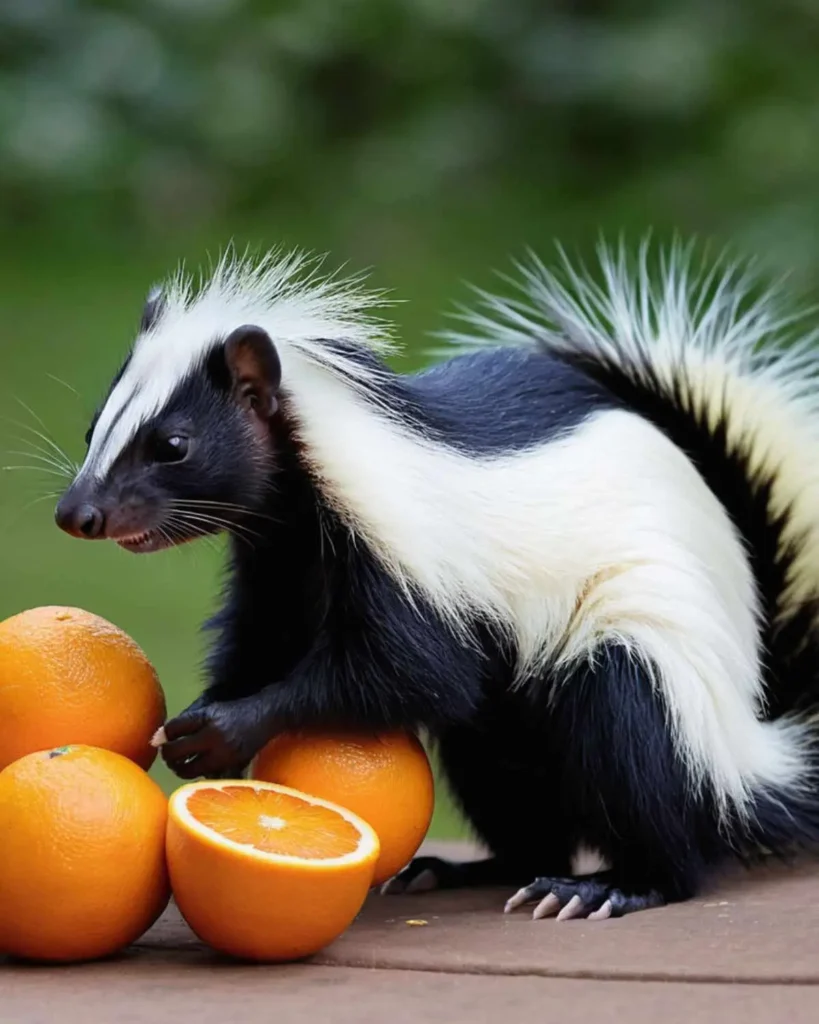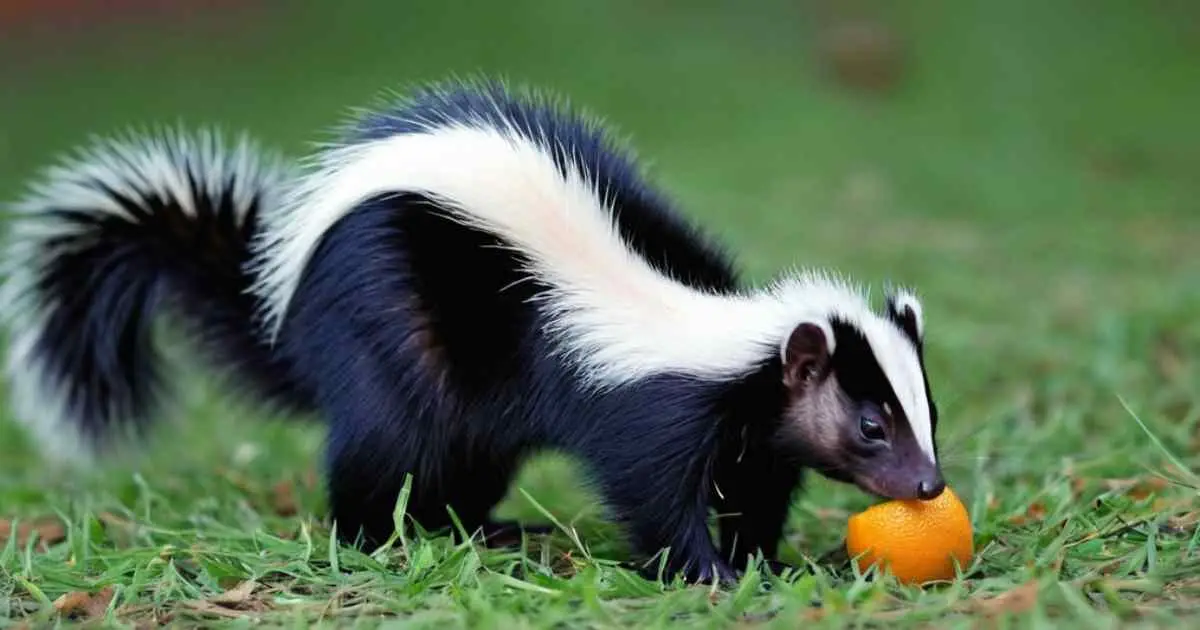Do Skunks Enjoy Oranges? What You Need to Know
Last updated on August 11th, 2024 at 07:32 am
Did you know that skunks can eat oranges? From my experience as a skunk pet owner and wildlife enthusiast, I’ve observed skunks enjoying a range of foods, including these juicy fruits. Skunks aren’t picky and will eat what’s available, making them fascinating creatures to study. Read on to find out how oranges fit into their diet!
The Omnivorous Nature Of Skunks
Skunks are not picky eaters. These crafty creatures enjoy a wide range of foods. With their omnivorous appetite, skunks can adapt to various environments. They are known for their surprising diet choices. One might wonder, do these animals enjoy fruits like oranges? Let’s delve into the diet composition of skunks.
Skunks’ Diet Composition
Skunks are omnivores by nature. This means they eat both plants and animals. Their diet includes:
- Insects – a prime source of protein.
- Rodents – for filling meals.
- Eggs – they steal from nests.
- Fruits – like apples and berries.
- Vegetables – they are found in gardens.
Skunks have a sweet tooth as well. They often seek out sugary foods. This is where fruits like oranges come into play.
Flexibility In Food Choices
Skunks show great flexibility in their diet. Their ability to thrive in different habitats depends on this versatility. If a food source is scarce, skunks easily switch to another. In urban areas, skunks might forage through trash. In the wild, they adapt to seasonal changes. During summer, they might feast on insects and fruits. When winter comes, they rely more on small rodents.
Oranges can be part of this flexible diet. They offer a juicy treat with essential vitamins. Skunks may eat oranges if they come across them. Yet oranges should be an occasional treat, not a staple in their diet.
Understanding a skunk’s diet helps us coexist with these creatures. It gives us insight into their role in the ecosystem. We can also keep our gardens safe by knowing what attracts them.
Citrus Fruits & Wild Animals
Many of us enjoy a juicy orange or a tangy lemon without a second thought. Animals in the wild also have their own preferred snacks. Yet, what happens when the vibrant world of citrus fruits crosses paths with curious creatures like skunks? Let’s peel back the layers and discover the impact of these zesty fruits on wildlife.
Common Fruits In Animal Diets
In nature, animals forage for a variety of foods to survive. Fruits often make up a crucial part of their diet. Fruits provide essential vitamins and energy. Wild animals typically feast on:
- Wild berries
- Melons
- Tree fruits like apples and peaches
Skunks, known for their striped coats and unique smell, are omnivores. This means they eat both plants and animals. While they normally munch on insects, rodents, and eggs, they occasionally enjoy fruits too.
How Citrus May Affect Wildlife
While skunks and other wildlife enjoy a varied menu, citrus fruits like oranges may not always be their top choice. Citrus fruits are acidic. This can impact wild animals differently. Here’s how:
| May nibble for moisture content but not a staple in the diet | Citrus Impact |
|---|---|
| Skunks | May eat in small amounts, but prefer sweeter fruits |
| Birds | Sometimes attracted to the fruit’s color, but rarely eat it |
| Squirrels | May nibble for moisture content but not a staple in diet |
It is important to note that feeding wildlife, especially with foods not native to their ecosystem, can cause more harm than good. It can change their natural foraging behavior. It can also affect their health.
Orange Appeal: Do Skunks Like The Fruit?
Imagine a skunk wandering into your backyard. What catches its eye? Often it’s something small and colorful like an orange. But do skunks enjoy eating oranges? This post explores the intriguing relationship between these black and white creatures and the juicy citrus fruit.

Potential Attraction To Oranges
There’s something about oranges that might lure a skunk in. It could be the bright color or the fruit’s sweet scent. Skunks are curious by nature and often investigate new food sources. Their varied diet includes fruits and veggies.
- Bright color stands out
- Sweet, strong smell
- Curiosity drives investigation
Scent And Taste Preferences
Skunks have a keen sense of smell, which guides them to food. Oranges emit a strong, sweet aroma that can attract skunks from afar. Though they are opportunistic eaters, skunks might prefer other foods over oranges due to taste or availability.
| Foods Skunks Prefer | Occasionally Eaten |
|---|---|
| Insects | Fruits like oranges |
| Small rodents | Berries |
| Eggs | Nuts |
Oranges may not be the first choice for a skunk. Skunks may eat oranges but often choose other foods. If oranges are all that is available, a skunk will not hesitate to indulge in the citrus treat.
Benefits & Risks Of Oranges In A Skunk’s Diet
Curious about skunks and their fondness for oranges? Skunks have diverse diets, but the introduction of oranges can have both positive and negative effects on their health. Exploring the benefits and risks helps us understand what’s best for these quirky animals.
Nutritional Value Of Oranges For Skunks
Oranges offer vital nutrients beneficial to a skunk’s diet. Rich in vitamin C, they boost the immune system. They also provide dietary fiber for digestive health. Low in calories, oranges are a tasty snack for skunks. Let’s dive into specifics:
- Vitamin C: Essential for repairing body tissues.
- Fiber: Aids in regular bowel movements.
- Potassium: Regulates fluid balance and muscle function.
Though these nutrients are crucial, moderation is key in a skunk’s diet to avoid complications.
Possible Health Complications
While oranges have benefits, they come with risks for skunks. High sugar content can lead to obesity and diabetes. Citric acid, abundant in oranges, might upset a skunk’s stomach, leading to discomfort or diarrhea. Potential health issues include:
- Weight gain from excessive sugar.
- Dental problems like tooth decay.
- Diarrhea from too much citric acid.
Monitor the skunk’s response when introducing oranges to their diet. Consult with a vet for personalized advice.
Human-skunk Interactions And Feeding Habits
Exploring the world of Human-Skunk Interactions and Feeding Habits sheds light on how these curious creatures navigate our backyards. Skunks, known for their signature scent defense, also have diverse diets that can bring them to your doorstep.
Backyard Encounters With Skunks
Skunks often roam into human spaces at night. They sniff around for food in gardens and trash. With their sharp sense of smell, skunks can locate meals in urban settings.
- They dig for grubs and insects underground.
- Fruits dropped from trees can attract skunks.
- Pet food left outside is a skunk’s temptation.
The Impact Of Human Food Sources
Offering human foods like oranges to skunks might seem harmless, but it affects their habits. Skunks may lose their natural fear of humans and can become persistent visitors.
| Food Type | Effects on Skunks |
|---|---|
| Oranges and other fruits | High in protein, it can make skunks dependent on human-provided food. |
| Human snacks | Often too salty or sweet for skunks, leading to health issues. |
| Pet food | High in protein, can make skunks dependent on human-provided food. |
In short, feeding skunks intentionally or accidentally can have unforeseen consequences. It’s best to keep human and pet foods indoors, ensuring skunks stick to their natural foraging.
Studying Skunk Behavior: Field Observations
Skunks are often seen as mysterious nighttime creatures. Understanding what they eat helps us know them better. Today, we delve into their eating habits with a particular interest in their taste for oranges. Let’s peek into what field observations have revealed about their diet.
Research On Skunk Foraging
Skunks are omnivorous, meaning they eat both plants and animals. Researchers in the wild have spotted them digging for grubs. But skunks have a sweet tooth too. Oranges might be on their menu. Let’s look at the evidence gathered from studies on skunk foraging habits.
- Skunks tend to eat seasonally-available foods.
- They have a keen sense of smell that leads them to ripe fruit.
- Citrus fruits, like oranges, could attract skunks due to their strong scent.
Data On Fruit Consumption
Are oranges truly part of a skunk’s diet? Scientific fieldwork gives us clues:
| Food Type | Skunk Preference |
|---|---|
| Berries | High |
| Oranges | Medium |
| Nuts | Low |
In areas where skunks and orange trees coexist, there have been reports of skunks eating fallen oranges. Though not a primary food source, oranges are part of their diverse diet. This shows their adaptability in foraging for food.
The above table reflects skunk preferences with “High” meaning a favorite, “Medium” being occasional, and “Low” signifying rare consumption. These findings support the idea that skunks may indeed enjoy oranges, albeit less frequently than other foods.
Expert Opinions On Skunks Consuming Oranges
Curiosity often leads us to wonder about the diet of our striped friends, the skunks. Skunks have a diverse palate, but do they enjoy the sweet citrus of oranges?

Wildlife Biologists’ Insights
Wildlife biologists share fascinating insights into skunks’ dietary habits. These creatures are omnivores. This means they eat both plants and animals. Fruit, including oranges, can be part of their diet. Yet, oranges are not their primary food source.
- Skunks prefer insects and small rodents.
- They might eat oranges when other food is scarce.
- Citrus fruits are not a natural part of a skunk’s diet in the wild.
Veterinarians’ Dietary Recommendations
Veterinarians specializing in wildlife stress the importance of a balanced diet for skunks. Oranges could potentially add vitamin C to their diet. But there are key considerations to keep in mind:
- The sugar content in oranges is high and can lead to obesity.
- Oranges should be a rare treat, not a staple.
- Skunks need a diet rich in protein to thrive.
Responsible feeding is crucial for the health of pet skunks. Seeking advice from a veterinarian is essential.
Guidelines For Feeding Wildlife
Exploring wildlife feeding behaviors often raises the question: do skunks eat oranges? While skunks are omnivorous, offering them food like oranges is not straightforward. Balancing the curiosity of feeding wildlife with responsible practices is crucial for their health and safety. Proper guidelines ensure we serve as good stewards of nature.
Responsible Feeding Practices
- Avoid processed foods; they can harm wildlife.
- Provide foods that suit the animal’s natural diet.
- Limit quantities to prevent dependency.
- Keep a safe distance to reduce human-animal conflicts.
- Research the dietary needs of local wildlife.
- Omit feeding if it risks animal health or attracts pests.
- Ensure food is clean and free of contaminants.
Developing Safe Feeding Protocols
Safe feeding protocols are essential for wildlife’s well-being. The goal is to minimize risks while observing and enjoying their natural behavior. Here are steps to establish such protocols.
- Identify species that may benefit from supplemental feeding.
- Assess the impact on the animal’s health and local ecology.
- Choose appropriate food items and verify they are safe.
- Determine suitable locations away from human dwellings.
- Set a feeding schedule that does not alter animal habits.
- Monitor the effects and be ready to adjust as needed.
Frequently Asked Questions
What Fruits Do Skunks Eat?
Skunks enjoy various fruits including berries, bananas, apples, and grapes. These fruits provide them with essential nutrients.
What Should You Not Feed A Skunk?
Do not feed skunks chocolate, caffeinated beverages, alcohol, or onions as these foods can harm them. Avoid giving them processed junk food and salty snacks.
What Is Poisonous To Skunks?
Skunks are highly sensitive to chocolate, caffeine, and aspirin, which can be toxic to them. Common pesticides and rodent baits also pose a significant poisoning risk to these creatures.
Conclusion
Skunks show a surprising interest in oranges when seeking diverse food sources. Their omnivorous diet allows for such occasional treats. While not a staple, these fruits provide hydration and nutrients. Remember, balance is key in skunk diets to maintain their health.

